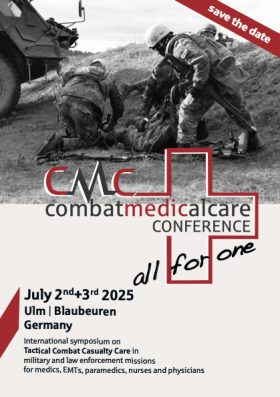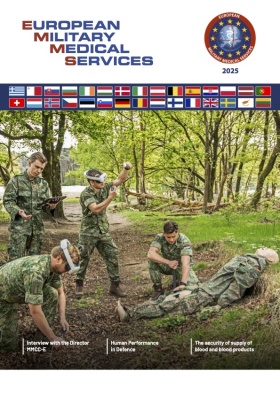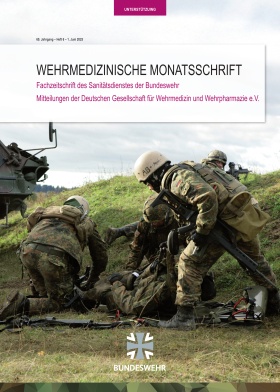
Interview
Cooperation and coordination are key to success – the multifocal role of the Czech Armed Forces Military Medical Service
Interview with Brigadier General Zoltan Bubenik, Czech Surgeon General
Could you please be so kind as to describe the main structures of the Military Medical Services in your country? Are there any specific characteristics?
The last year was extremely turbulent, on the one hand, the COVID 19 outbreak and the first year of the big reconstruction of the Czech Armed Forces Medical Service on the other. After almost 20 years of the strong connection and subordination within logistic structures, again independence, and standalone pure Military Medical Structure. But still in three pillars, which are connected both inside a civilian and military structure. Under the responsibility of my Surgeon General Office – Military Medical Division, we have all the deployable structures and units (field hospitals, CSU, MEDEVAC/ STRATEVAC), Primary Healthcare Units, Institute of the Hygiene and Epidemiology, Institute of the Veterinary Services, and many others. These units are integrated into the Military Medical Agency, where I had an opportunity to be a director since 2015 till the end of the year 2019. Military Hospitals and Faculty of Military Health Sciences, University of Defence, remain under the responsibility of the civilian divisions of the MoD, nevertheless cooperation is still my ultimate responsibility.
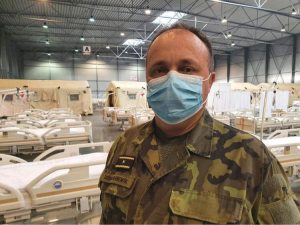 Field COVID hospital before opening October 2020 (source: AVIS)
Field COVID hospital before opening October 2020 (source: AVIS)
What role does the Medical Service play in your country’sarmed forces?
As I mentioned above, the key coordination, conceptual, and standardization work and of course, key advisory role, is the responsibility of the Military Medical Division and is lying in the Surgeon General’s hands. Especially to be an advisor to the CHOD and the Minister of Defence. Because legislation covering the delivery of the medical, hygiene and veterinarian care is the same as for the civilian counterpart, we are running a daily business at the same level as the civilian service, but predominantly to the military personnel. So, this is a description of the “peacetime” situation. Moreover, the responsibility the support the deployable forces or, if you want, the responsibility for the crisis and “wartime” is a key task for the Military Medical Agency.
Could you please describe your cooperation with other military medical forces?
Due to the long-term existence of Czechoslovakia is of course still the tightest connection with our Slovak colleagues. The same level of education - for example after a split of former Czechoslovakia to the Czech and Slovak Republic - we again three years ago reincarnated education for our Slovak medical cadets in cooperation with the Faculty of Military Health Sciences. Another level of closer cooperation is with Poland, Hungary, and again Slovakia on the Visegrad Four Platform. However, the cooperation with other Military Medical Forces is mainly on an expert level – education and training courses, COMEDS working groups and panels, and many more. What I would like to stress is a cooperation on the institutional level, especially MilMED CoE in Budapest and Multinational Medical Coordination Centre/European Medical Command in Koblenz. These institutions play for us a key role in a multinational support.
How did the role change during the Corona pandemic situation – referring to the Czech Republic – which work did you do, how was the CMC?
We started to play a key advisory role, not only as a healthcare provider. There is close cooperation with the Ministry of Health, the Ministry of Interior, and many other institutions. This is highlighting the overall importance of strong military medical service. And finally, civil-military cooperation due to the crisis became true.
Are you involved in the nationwide vaccinations? What is the role of the military medical services in questions of vaccination logistics and when do you hope that a large part of the population can be vaccinated?
Vaccination in the Czech Republic is slower in comparison with other countries; however, the speed is going up within the last few weeks. I see the main reasons for the delay of the vaccine distribution from producers to the target countries, and of course, in the national line of distribution. However, we are improving. Military Medical Service is strongly participating mainly with an organizational issue, as coordination on the national level, establishing procedures and statistics. But – till this time (end of March) approx. 15 percent of the whole population is vaccinated, so it means a delay regarding the plans 1-2 months ago. If everything is going on according to the plan, in the middle of this year we could have vaccinated around 40-50% of a target number, and if 60% is demanded, we´ll be close.
Could you describe the cooperation within the European Military Medical Services during the Corona pandemic situation?
The main coordination or if you want consultation has been running almost since the beginning of the outbreak. So many phone calls, e-mail discussions, video teleconferences started very early. We discussed a different topic concerning a personal protective measure, technical equipment lacks (oxygenators, ventilators, etc.). Later we discussed possibilities of the therapy, progress on the vaccination development. But in my opinion, the key factor was a regular information exchange which showed the ability to help each other – with advice, lessons learned, deployment of the experts to other countries and last but not least – donation of the missing equipment.
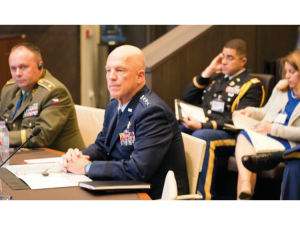 First brief for a MC in NATO (source: NATO)
First brief for a MC in NATO (source: NATO)
General fitness is an important topic within the armies worldwide. Do you have launched any special fitness programs?
I must say that due to the national level of regulations the overall fitness of the population and the military too, was jeopardized. So, support done by military trainers delivered by social media to the target audience was one of the options, how to remain a military troop in an adequate condition. But we cannot see only a physical aspect of fitness as an important issue. A very effective nationwide psychological support was delivered again via social media, and there the military psychologists in cooperation with Faculty of Medicine launched a program to remain a population in good psychological status. For example, a direct effect is visible in a military environment, where the incidence of suicidal tendencies was almost zero last year.
How do you deal with legal drugs like tobacco and alcohol – is this an issue within the army?
Approximately ten years ago the Czech Republic and of course the military environment too started participation in a huge program named Reduction of the dependencies – mainly alcohol, drugs, tobacco, illegal drugs, and gambling. This is a nationwide program, where the military is playing a very important role. And why? Because in our environment healthy personnel – physically and mentally – is a key factor in success. Success in a fight, deterrence, and sustainability of the forces. Regular checks for alcohol and illegal drug detection, very strict rules on alcohol-consuming during deployment led to visible success. Therefore, a continuous activity regarding to prevention plays a very important role.
What developments has your Medical Service seen in the last 5 years and where do you see the specialist medical priorities in the future?
First of all, an increasing number of military medical cadets. We can see approximately a 50% increase compared to the last years. So, there I see a key factor for possible future success. Second development is seen in a structural change mentioned above, leading to an independent medical commanding body with a direct approach to CHOD. And third is a continuous activity regarding technical improvements as new equipment for field hospitals or if you want – overall support for deployability of the medical forces. The medical specialist priorities I see in fact in two main areas – and no matter if doctor or nursing staff. First, is an area of general practitioners and an adequate nursing staff. Why? Because these positions are covering a maximum of the peacetime activities as daily medical business for forces in their peacetime installations, support for a training activities both forces and our own field training. And a combination of the GP skills “updated” on a level of the basic urgent medicine skills is ideal for deployment regardless of peacekeeping or wartime operations. The second important group is an “invasive medical specialist” – all kinds of surgery and urgent medicine. This is a very hard task for a Military Medical Service because all these specialists are very attractive for a civilian environment and sometimes, we as the military are not so successful in their retention. So, these two categories are a basis for future sustainability.
Many Military Medical Services suffer from a lack of personnel. What is your situation – are you able to fill all the positions and if not, where is there a specific shortfall?
Of course, I cannot say I am fully satisfied. As you know recruitment and retention of the medical personnel is a never-ending story with a period of loss and success. But at least partial independence in the civilian sector due to still functional Faculty of Medical Health Sciences as a primary source of the medical specialist is very important. In the countries where Military Medical Services are dependent on the competition with the civilian sector, the problem is a deeper one. And for the category of nursing staff, we have still enough volunteers from a civilian environment willing to join the Armed Forces. This is important especially to the category of fully educated and skilled nurses and medics because for us this personnel is almost immediately ready to deploy after a short 2-3 months-long period of basic military training. So, this is an advantage. The specific shortfall I see in a category of the Role 1 staff, because these specific positions are not so attractive for a young graduated doctor. But everything is under development and I am persuaded to reach a satisfactory number for these positions within the next 5 years.
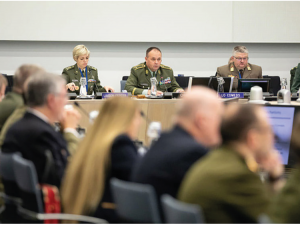 COMEDS Plenary 2019 NATO HQ Brussels (source: NATO)
COMEDS Plenary 2019 NATO HQ Brussels (source: NATO)
How is the quality of your technical equipment?
Regarding to deployable medical treatment facilities (MTF´s) we can be satisfied. The renovation of the hospital corridor, specialized containers, bedside equipment, and let say overall status for a deployment is quite good. In the concept of the Armed Forces development and the consequent development of the Military Medical Services till the years 2025-2030, we have allocated a satisfactory amount of the military budget, so perspective for a running process of the technical renovation is again good. We will focus on some key programs as the
New Role 1 concept, FSE/SOST (Forward Surgical Element and Special Operations Surgical Team) concept development, and let me say focus on “lightweight equipment and installation” are a basic principle on way ahead. Due to last year budgetary constraints, we are unfortunately behind on the innovation of the transport means, both “soft skin” and armoured. But I am not scared yet because it means practically only move in the timeframe, better said postpone to the years 2024-2027.
Cooperation on a European level is being intensified; one visible indication of this is the Multinational Medical Coordination Centre, MMCC. The medical service sector within the joint European defence policy is to be consolidated here. How do you see Czech’s role in this project?
The Czech Republic and our Armed Forces Military Medical Service was since the beginning of the process a strong supporter. I appreciated an area of the responsibility of the MMCC and willingness to fill up a gap in the NATO structure for the support dedicated on the strategic or operational level. Even if the MMCC/ EMC is still not an integrated part of the NATO Command or Force structure, we can see an increasing activity in the different areas. First of all an advantage, I see in the unique combination of the activities toward the NATO and EU. And why is this possible? Because we are working mainly on the medical issues. And there we cannot simply distinguish between NATO and EU, between peacetime or wartime, even between eastern and western medicine. In the principles, we are unified. Integrated. Impartial. Working on the humanitarian principles and results from Hippocrates oath. So, these are our strengths and opportunities. Our support for a MMCC/EMC is mutual. We are (as the Czech Republic) working in the Steering group, joining the training and exercise activities, and of course planning future direct support with a possible deployment of the national military medical experts, like other NATO and EU members do. Now it is a question of a possible quote for a position dedicated to medical experts abroad. I as the Czech Armed Forces Surgeon General have an opportunity to stay with them since the first steps and both commanders – previous, BG Most and current, BG Kowitz - have my strong support. And within the last two years not only as a national delegate but additionally mainly as a COMEDS Chairman. Because we together have to bring visibility not only on a medical level – this is obvious - but also for a mutual success trying to bring this institution to the official position according to NATO and EU structures.
What are your expectations in this regard?
As I mentioned, the assessment of the military medical activities, especially in the last two years, reached an undisputable level. Training and exercise activities, coordinated advisory role with close cooperation with MilMED CoE in Budapest, and finally, one of the key advisory roles connected with the last year COVID 19 situation were appreciated not only with COMEDS Medical Services, but from the NATO HQ Military Committee, too. It means they are on the right way. But to be recognized as an official NATO/EU supportive Military Medical Institution requests a very long way. Honestly, this is an official status. The COMEDS community without any doubt is regularly assessing their activity with a regular COMEDS Plenary briefing, joining their activities offered to reach an adequate level of interoperability, and what is very important, we see this institution as complementary, not competitive. If I compare the areas of responsibility with the MilMED CoE, we can see some similarities, but more differences and specific interests. And I see especially an opportunity connected with a future organization of the medical training, regarding interoperability of the Medical Forces, what is the main idea of the VIGOROUS WARRIOR exercise series. This is still a key responsibility of the MilMED CoE, but I see the opportunity for a MMCC/EMC in specific areas to support a key player.
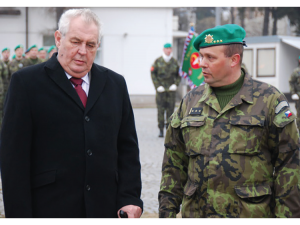 Presidential visit Military Medical Agency 2015 (source: AVIS)
Presidential visit Military Medical Agency 2015 (source: AVIS)
You have been the COMEDS Chairman for some time now. What obligations does such an office entail – and what opportunities do you see?
When in 2015 during Dublin COMEDS Plenary I have got an opportunity to led one syndicate with a BEL SG MG Laire and later present the outcomes of this syndicate to the other Surgeon Generals, I never imagined that this was a small if you want preliminary testing to lead a bigger “squadron” as the COMEDS whole family. In the Czech Armed Forces, I was a brand-new Surgeon General, replacing my predecessor BG Jurenka, and of course, to sit on a COMEDS Plenary table in a first position, as a national representative, was a totally different situation compared to a backseater! Nevertheless, this offer made to me – please think about a takeover of the COMEDS Chairman position – was a big surprise. I never imagined both being a SG and of course the COMEDS Chairman. But after the official statement made during the COMEDS Plenary in the Czech Republic in 2018 and the result of the election, it happened. For me a big challenge – lead a Czech Medical Service, being COMEDS Chairmanship, and still, the necessity to sustain my personal medical skills are very difficult to combine. On the other hand, the chairmanship in the “corona time” is the best opportunity how to raise the importance of the Medical Services and finally confirm, that this period is the best from the perspective to show our interoperability, no matter if on the national or international level.
Are there any particular points you would like to make us aware of?
During the last years we as a medical community show the importance of our advice, direct help, and influence for the military but the civilian area, too. We confirmed our impartiality, ability to work together during exercises, deployments, and finally homeland crises. The Covid era will be I hope very soon history, and we have to look into the future. And this is bright not only due to my temperament as an optimist. Everything in this world has a beginning and an end. I am confident!
Date: 08/18/2021
Source: EMMS 2021









